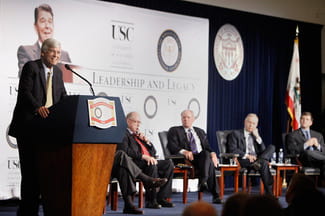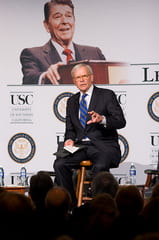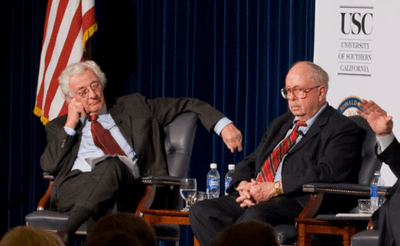More than two decades after he exited the political stage and rode off into the California sunset, President Ronald Reagan continues to spark passionate debate about his policy achievements, foreign policy, and political legacy.
“Ronald Reagan was a great president, and he will be remembered in history for one thing, winning the Cold War,” exclaimed Reagan biographer Lou Cannon to a standing room only crowd of more than 500 students, scholars and Reagan admirers, who came to the Ronald Reagan Presidential Library in Simi Valley, California on February 2 for a discussion led by legendary journalist and author Tom Brokaw.

The program, organized by the USC Annenberg Center on Communication Leadership in partnership with the USC School of Policy Planning and Development, the USC Bedrosian Center on Governance and the Public Enterprise, and the Ronald Reagan Presidential Foundation, concluded a two-day conference, The Ronald Reagan Centennial – An Academic Symposium. Throughout each of the four panels, biographers, historians and scholars cited Reagan’s communication skills, political pragmatism, and sense of optimism as key components to his success.
“A pure product of Main Street, Heartland America. He even looked the part,” Brokaw explained in a half hour keynote that touched on their four decade relationship. “People were comfortable with him from the very beginning.”

Following his opening remarks, Brokaw (pictured right) moderated the panel “Biography and the Construction of Legacy,” which featured CCLP senior fellow and Reagan biographer Richard Reeves, author and former Washington Post reporter Lou Cannon, former US Senator and California Governor Pete Wilson, and presidential historian Douglas Brinkley.
CCLP director and panel organizer Geoffrey Cowan, also an award-winning biographer, introduced the discussion with an overview on the role of biography in constructing legacy.
“If journalism is the first draft of history, which in the case of individuals, frames reputations,” Cowan said. “History itself and particularly biography might seem to be the final draft that produces legacy.”
While many historians believe that it may be too soon to predict where Reagan will rank among America’s greatest presidents, the panelists agreed that the Great Communicator’s role in winning the Cold War, along with his trademark optimism and penchant for political pragmatism, will serve as defining characteristics of his presidential legacy.

“Reagan was not a great president but was great at being president. Despite political differences, he was able to work with both Republicans and Democrats in Congress,” writes Reeves, author of “The Last Campaign: Legacy,” an academic paper prepared for the symposium. “He understood that words were often more important than deeds for the leader of a sprawling and diverse nation and, though many conservatives thought he was wrong, he understood the weaknesses of Communism in general and the Soviet Union in particular.”
Reeves’ paper, along with three others and an address by noted historian and USC University Professor Kevin Starr will be published as a volume to contribute to the scholarship on President Reagan.
Also, as part of the symposium, CCLP faculty fellow Tom Hollihan organized the panel “Communicating Leadership: Reagan, Rhetoric, and the ‘Great Communicator’ Revisited.” The program featured a presentation by Robert Rowland, professor and director of Graduate Studies at the University of Kansas and responses by Mary Stuckey of Georgia State University; Dr. Craig Smith, a former presidential speechwriter and professor at California State University, Long Beach; and Dan Schnur, chairman of the California Fair Political Practices Commission and director of USC’s Jesse M. Unruh Institute of Politics.
Download a PDF of “The Last Campaign: Legacy” by Richard Reeves
For related articles:
Panelists Review Ronald Reagan’s Time In Politics [NPR]
Political Debate at the Reagan Library [KNBC]
“Biography and the Construction of Presidential Legacy” Panel” [SPPD]
“Communicating Leadership: Reagan, Rhetoric, and the ‘Great Communicator’ Revisited” Panel [SPPD]